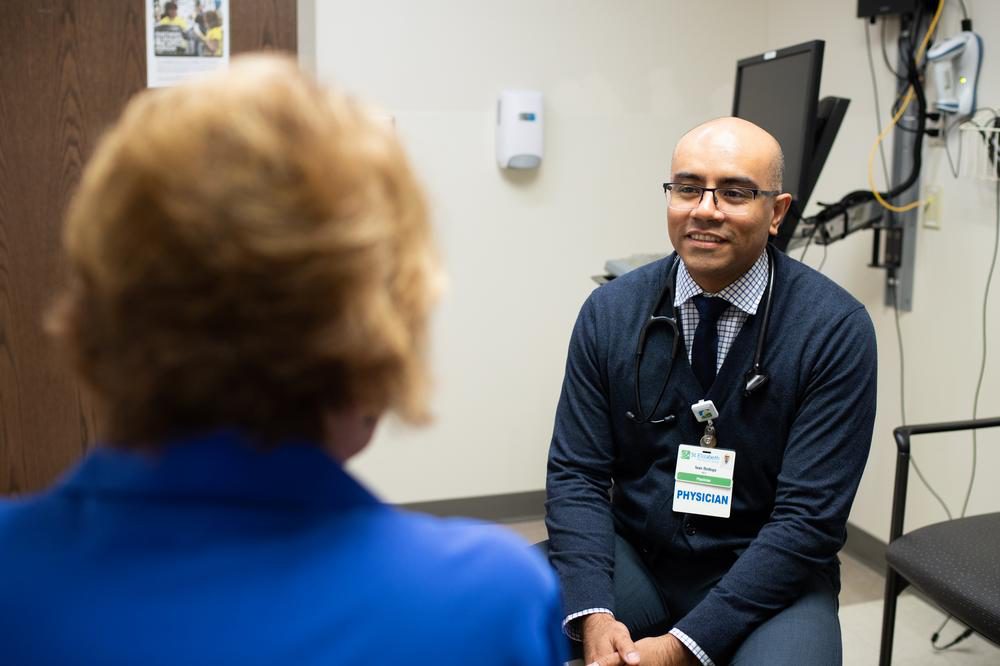Blood Cancer
At St. Elizabeth Healthcare, we understand that a cancer diagnosis affects every aspect of your life. Our multidisciplinary team of experts focuses on your individual needs and goals to offer personalized cancer care that provides the best possible outcome. We walk with you every step of your cancer journey to address your concerns in real-time and get you on the road to survivorship.
We build a team with the expertise you need to manage the health challenges cancer brings, including board certified medical and surgical oncologists, genetics, physical therapists, social workers, nurses, physician assistants and pastoral care. These compassionate, experienced professionals all work together to ensure you receive the most advanced diagnosis, treatment and management options available today.
What are blood cancers?
Blood cancers affect both the production of your blood cells and how well they function. They typically start in your bone marrow and most often result in excessive and abnormal reproduction of white blood cells. Our team offers comprehensive care for all types of blood cancers, including:

Make an appointment
For more information, please contact your oncologist or the Cancer Care Center at (859) 301-4000
Blood Cancer Screening
Researchers are working hard to detect blood cancers in their earliest stages, but so far, no test is reliable at detecting blood cancer before symptoms start. There are not yet screening procedures for blood cancers such as leukemia, multiple myeloma or lymphoma.
Doctors may discover blood cancer when doing blood work for other suspected illness or during a routine physical examination.
Blood Cancer Genetic Testing
If you have a family history of cancer and are concerned you could develop it, genetic counseling is an option to consider. It can help determine whether you carry a cancer mutation or gene that increases your risk. St. Elizabeth is the only cancer program in Northern Kentucky that offers a team of on-site genetic counselors.
For patients diagnosed with blood cancer, our hereditary cancer program offers information and resources on inherited disease. Genetic testing can help determine how a cancer will respond to treatment — and allow us to develop a laser-focused treatment plan specific to your cancer cells’ anatomy.
Blood Cancer Diagnosis
Diagnosing blood cancer typically begins with a physical examination and a review of any symptoms you may be having. If your doctor suspects you could have blood cancer, you will need further testing.
Properties in your blood provide valuable clues to your health. Several blood tests are used to diagnose blood cancer. These include:
Blood Cancer Treatments
Treating blood cancer requires an individualized approach that takes a wide range of factors into account, including the type and stage of your cancer and whether it’s spread into other areas of your body.
Treatment options may include:
Blood Cancer Surveillance
Some blood cancers may not require immediate treatment. At St. Elizabeth, we keep a close eye on your condition for some cancers, such as leukemia. We perform tests and physical examinations regularly to monitor your symptoms and whether your cancer is progressing.
If you do require treatment, our team looks out for you long after treatment is done. We carefully monitor your condition for at least five years after your diagnosis and adjust your care if we see any indications that your cancer has returned or spread. Our comprehensive surveillance schedule meets your unique medical needs and can include:
- Follow-up visits
- Occupational therapy
- Physical therapy
- Routine testing
- Specialist appointments
- Support group recommendations
Certified oncology data specialists maintain and update our Cancer Registry. St. Elizabeth keeps a record of all the cancer cases we’ve diagnosed or treated since 2000. We use this database to gather vital information, stay on top of trends, measure the effectiveness of different treatments, and gauge cancer’s impact on our community.
Nurse Navigators Help You Move Forward with Confidence
Our nurse navigators are vital in guiding and supporting you through the cancer treatment journey. With their specialized knowledge and compassionate approach, nurse navigators offer constant assistance, providing valuable information, coordinating appointments and helping to navigate the healthcare system. They offer emotional support, answer questions and address concerns to ensure you feel empowered and well-informed.
By serving as a trusted advocate, nurse navigators steer you through the challenges of cancer treatment, enhancing your overall experience and providing personalized care every step of the way.


